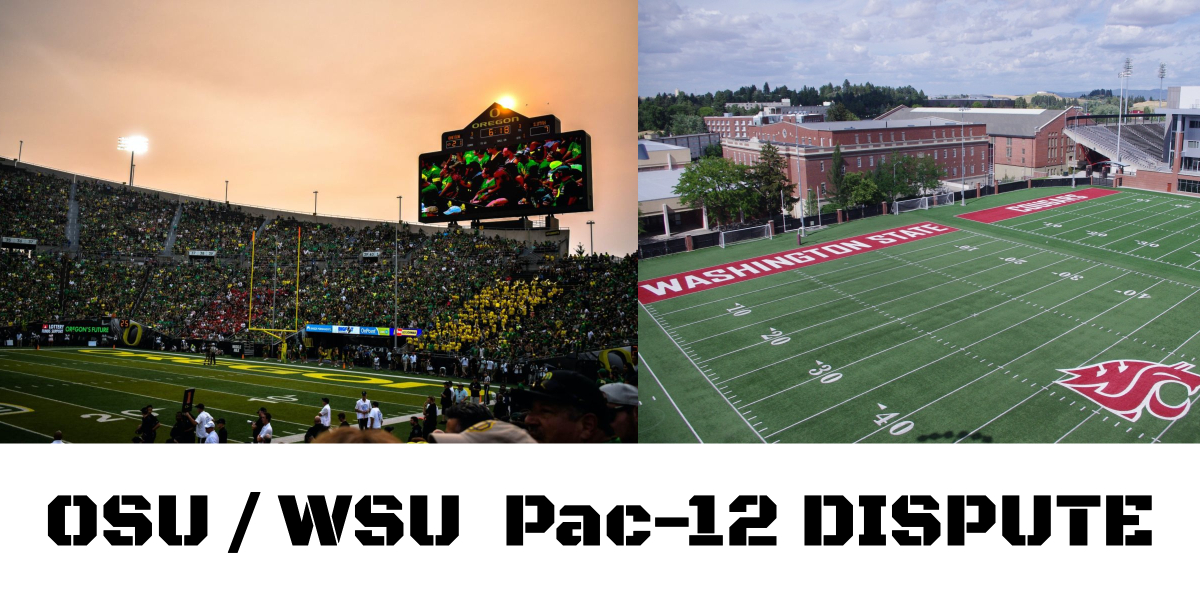“Washington State University and Oregon State University Face Legal Battle in Pac-12 Dispute”
In a recent legal battle, Washington State University (WSU) and Oregon State University (OSU) have found themselves at odds, as they compete for a coveted spot in the prestigious Pac-12 conference. The dispute has reached the Washington Supreme Court, where both universities are vying for a favorable ruling that would solidify their position within the Pac-12.
The Pac-12, known for its powerhouse athletic programs and academic excellence, has been a highly sought-after destination for universities across the Western United States. It offers not only the prestige of membership but also lucrative financial opportunities, including revenue sharing from television contracts and sponsorship deals.
The root of this legal battle lies in WSU’s controversial attempt to join the Pac-12, a move that OSU vehemently opposes. The conflict has escalated to the point where it required judicial intervention to resolve the issue. The Washington Supreme Court’s decision will undoubtedly have far-reaching consequences for both universities, their athletic programs, and the landscape of college sports in the Pacific Northwest.
WSU’s argument centers on its impressive athletic achievements and its commitment to elevating its athletic program to Pac-12 standards. The university boasts a strong football team, a thriving basketball program, and a passionate fan base. They argue that their inclusion in the Pac-12 would not only benefit WSU but also enhance the conference’s overall competitiveness.
On the other hand, OSU contends that WSU’s inclusion would dilute the conference’s academic and athletic standards. OSU, which has been a longstanding member of the Pac-12, prides itself on its academic excellence and its commitment to upholding the conference’s prestige. They argue that WSU’s addition could potentially compromise these values.
This legal battle has generated widespread interest not only within the academic and athletic communities but also among sports enthusiasts and the general public. The outcome could set a precedent for future disputes over conference realignment and membership in college sports.
Legal experts expect the Washington Supreme Court to consider several key factors in making its decision. These factors include the financial implications for both universities, the potential impact on the competitive balance within the Pac-12, and the long-term consequences for the conference’s reputation.
Financial considerations play a significant role in this dispute. Membership in the Pac-12 brings substantial financial benefits, including a share of television revenue, sponsorship deals, and increased exposure for the universities. Both WSU and OSU stand to gain or lose millions of dollars depending on the court’s ruling.
Moreover, the court must weigh the impact of WSU’s inclusion on the Pac-12’s competitive balance. While WSU argues that their addition would make the conference more competitive, OSU maintains that it would lead to a dilution of talent and a potential decline in the conference’s overall athletic performance.
Additionally, the court will consider the long-term consequences of its decision on the Pac-12’s reputation. The conference has a storied history of academic excellence and athletic prowess, and any decision that could compromise these values will have a lasting impact.
As the legal battle unfolds, both WSU and OSU are eagerly awaiting the Washington Supreme Court’s decision. The outcome will not only determine their fate within the Pac-12 but also shape the future of college sports in the Pacific Northwest. The court’s decision is expected to be a landmark ruling with far-reaching implications for universities and conferences across the country.
The legal battle between Washington State University and Oregon State University over Pac-12 membership is a high-stakes conflict with significant implications for both institutions and college sports in the region. The Washington Supreme Court’s ruling will hinge on financial considerations, competitive balance, and the long-term reputation of the Pac-12. As the case progresses, all eyes are on the court’s decision, which could set a precedent for future disputes in the world of college athletics.


